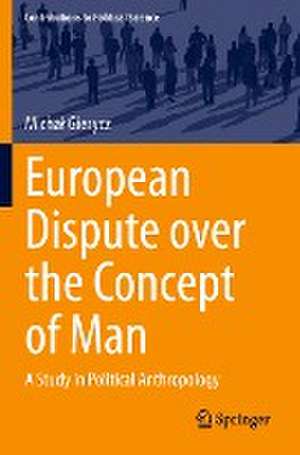European Dispute over the Concept of Man: A Study in Political Anthropology: Contributions to Political Science
Autor Michał Gieryczen Limba Engleză Paperback – 12 ian 2022
| Toate formatele și edițiile | Preț | Express |
|---|---|---|
| Paperback (1) | 791.71 lei 43-57 zile | |
| Springer International Publishing – 12 ian 2022 | 791.71 lei 43-57 zile | |
| Hardback (1) | 798.03 lei 43-57 zile | |
| Springer International Publishing – 12 ian 2021 | 798.03 lei 43-57 zile |
Din seria Contributions to Political Science
- 18%
 Preț: 724.17 lei
Preț: 724.17 lei - 24%
 Preț: 633.39 lei
Preț: 633.39 lei - 17%
 Preț: 524.54 lei
Preț: 524.54 lei - 15%
 Preț: 583.61 lei
Preț: 583.61 lei -
 Preț: 380.63 lei
Preț: 380.63 lei - 15%
 Preț: 471.69 lei
Preț: 471.69 lei - 18%
 Preț: 780.82 lei
Preț: 780.82 lei - 18%
 Preț: 785.86 lei
Preț: 785.86 lei -
 Preț: 379.86 lei
Preț: 379.86 lei - 15%
 Preț: 695.85 lei
Preț: 695.85 lei -
 Preț: 390.84 lei
Preț: 390.84 lei - 18%
 Preț: 777.50 lei
Preț: 777.50 lei -
 Preț: 387.75 lei
Preț: 387.75 lei -
 Preț: 394.29 lei
Preț: 394.29 lei - 15%
 Preț: 635.15 lei
Preț: 635.15 lei -
 Preț: 381.42 lei
Preț: 381.42 lei - 18%
 Preț: 798.66 lei
Preț: 798.66 lei -
 Preț: 392.37 lei
Preț: 392.37 lei -
 Preț: 391.02 lei
Preț: 391.02 lei -
 Preț: 359.76 lei
Preț: 359.76 lei - 18%
 Preț: 788.90 lei
Preț: 788.90 lei -
 Preț: 387.58 lei
Preț: 387.58 lei -
 Preț: 395.47 lei
Preț: 395.47 lei - 20%
 Preț: 579.41 lei
Preț: 579.41 lei - 15%
 Preț: 643.34 lei
Preț: 643.34 lei -
 Preț: 384.86 lei
Preț: 384.86 lei -
 Preț: 487.57 lei
Preț: 487.57 lei - 18%
 Preț: 781.62 lei
Preț: 781.62 lei - 18%
 Preț: 734.09 lei
Preț: 734.09 lei - 15%
 Preț: 645.79 lei
Preț: 645.79 lei - 15%
 Preț: 698.62 lei
Preț: 698.62 lei -
 Preț: 396.62 lei
Preț: 396.62 lei - 15%
 Preț: 584.26 lei
Preț: 584.26 lei - 18%
 Preț: 727.80 lei
Preț: 727.80 lei -
 Preț: 393.35 lei
Preț: 393.35 lei - 15%
 Preț: 651.84 lei
Preț: 651.84 lei
Preț: 791.71 lei
Preț vechi: 965.50 lei
-18% Nou
Puncte Express: 1188
Preț estimativ în valută:
151.50€ • 158.57$ • 126.09£
151.50€ • 158.57$ • 126.09£
Carte tipărită la comandă
Livrare economică 31 martie-14 aprilie
Preluare comenzi: 021 569.72.76
Specificații
ISBN-13: 9783030615222
ISBN-10: 3030615227
Ilustrații: XV, 504 p. 233 illus., 231 illus. in color.
Dimensiuni: 155 x 235 mm
Greutate: 0.72 kg
Ediția:1st ed. 2021
Editura: Springer International Publishing
Colecția Springer
Seria Contributions to Political Science
Locul publicării:Cham, Switzerland
ISBN-10: 3030615227
Ilustrații: XV, 504 p. 233 illus., 231 illus. in color.
Dimensiuni: 155 x 235 mm
Greutate: 0.72 kg
Ediția:1st ed. 2021
Editura: Springer International Publishing
Colecția Springer
Seria Contributions to Political Science
Locul publicării:Cham, Switzerland
Cuprins
1. Introduction.- Part I: Political Anthropology and Studies in Political Science.- 2. Anthropologies and Their Relationships .- 3. Political Anthropologies.- 4. Towards a Politological Approach to Political Anthropology.- Part II: The Anthropological Dispute in European Political Thought.- 5. Two Visions of Politics and Two Visions of Man.- 6. Constrained Anthropology.- 7. Unconstrained Anthropology.- 8. The Anthropology of Late Modernity.- Part III: EU Political Disputes in the Anthropological Perspective.- 9. Around Morality Policy.- 10. Anthropological Pillars of EU Politics.- 11. Anthropological Analysis of the Language and Contents of EU Documents.- 12. Anthropological Analysis of EU Decision-Making Processes.- 13. Conclusion.
Notă biografică
Michał Gierycz is an associate professor of political science and a dean of the Faculty of Social and Economic Sciences at the Cardinal Stefan Wyszyński University in Warsaw, Poland. His main research areas include axiology and anthropology of politics, relations between religion and politics and European integration. He won the Countess Aniela Potulicka Award and the Feniks Award in 2018.
Textul de pe ultima copertă
The book represents original research in a field of study rarely pursued while analysing the intellectual dimensions of disputes over ethically sensitive issues that occur in European Union politics. These disputes are generally analysed at ideological, ethical, economic and interstate levels. However, these references do not suffice in understanding the issue, which is related to a divergent perception of the essence of humanity and thus the subject matter of anthropology. The main research objective of the monograph is therefore to reconstruct the sources and the specific European Union way of thinking about the human being. Methodologically, the book expands the understanding of political anthropology within political science and presents a range of suitable instruments for pursuing anthropological research. At the theoretical level, it proposes an anthropological typology of the main currents of European political thought and reveals their prominence for the anthropological orientation of the EU's axiology. Empirically, it provides an analysis of the anthropological features of European Union institutions and policies in addition to discussing the relation between the axiological and anthropological positions of the main political and national groups within the EU.
Caracteristici
Describes current trends in the European Union's morality policy Analyses current value debates from an anthropological perspective Expands understanding of political anthropology within political science and proposes new tools for research
